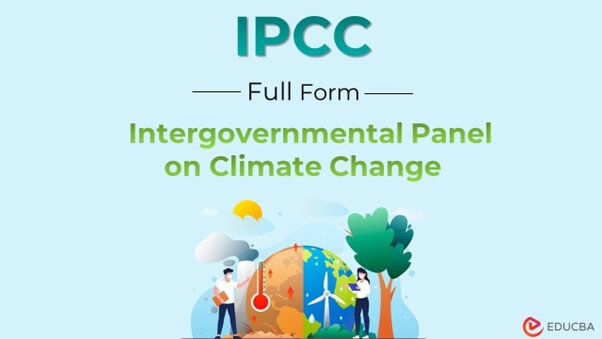Updated April 15, 2023
What is the Full form of IPCC?
The full form of IPCC is the ‘Intergovernmental Panel on Climate Change. It is an international body that primarily focuses on the scientific assessment reporting of climate change and how to mitigate it from continuing to harm the Earth. Set up in 1988 by the United Nations Environment Programme (UNEP) and the World Meteorological Organisation(WHO), today 195 countries are associated with it. Today, IPCC’s periodic assessments and reports hold the topmost authority in the climate change sector.
What is the Role of the IPCC?
IPCC’s aim in assessing, controlling, and preventing climate change is significant. The organization’s panel comprises climate change experts who prepare comprehensive scientific assessment reports.
These reports cover
- Technical and socio-economic knowledge of climate change
- The areas where extensive research is necessary to study climate change.
- Drastic impacts of climate change in both present and future
- Steps and guidelines for mitigating and adapting to climate change.
Now, after discussing the full form of the IPCC, let’s move to its report’s objectivity.
How IPCC Ensures Objectivity?
IPCC’s report goes through several stages of review before getting published. To keep the panel members up-to-date:
- IPCC conducts regular panel meetings
- It organizes expert workshops.
- It holds extensive discussions with policymakers, scientists, and even the general public to ensure their assessments and reports are understood by them as intended.
Who Prepares IPCC Reports?
The three IPCC Working Groups, each associated with a different area of climate change, prepare all IPCC assessments and special reports.
1. Working Group I:- It focuses on the physical science of climate change, including observations, modeling of the climate system, and causes of climate change.
2. Working Group II:- This group focuses on the impacts of climate change, including the potentially vulnerable socio-economic and natural systems and their effects, with suggestions for higher adaptability.
3. Working Group III:- This working group focuses on mitigation strategies to prevent climatic changes from going haywire in the long term. Apart from these three working groups, IPCC also has a dedicated task force.
IPCC’s TFI
- IPCC Task Force, or The Task Force on National Greenhouse Gas Inventories, is a member force that IPCC established in its 14th session in October 1988 to oversee IPCC-NGGIP.
- It focuses on refining and developing new software for assessing national greenhouse gas (GHG) emissions and their removals.
- The other objective of TFI is to encourage the adoption of its GHG assessment methodology by IPCC member countries and the United Nations Framework Convention on Climate Change (UNFCCC) members.
Role of TFI
Together with Working Groups, TFI handles report preparation and manages work relationships with climate change experts who work as scientific authors for the organization.
Significance of IPCC
- Better International Climatic Decision-Making:- Help policymakers for informed decision-making at national and international levels.
- Climatic Assessment Capacity Building:- It provides climatic and technical training with assistance and other necessary support to encourage countries and regions to build their capacity to assess climate change.
- Publish Special Reports:- IPCC special reports cover climate-change-related topics such as the potential for renewable energy in mitigating climate change. One of the special reports mentioned the potential of carbon capture and storage technologies for reducing GHG emissions.
Which was the Recent IPCC Assessment Report?
The Sixth Assessment Report (AR6), published in April 2022, is the latest scientific assessment report on climate change by IPCC Working Group III. The report discussed the updated global climate change assessment, sources of GHG emissions, mitigation progress, etc.
IPCC Assessments’ Potential Loopholes
Even though IPCC’s role in understanding climate change from the inside out is impeccable, it still has some pitfalls associated with its work.
1. Infrequent reporting
The IPCC’s periodic assessments only come out every 5-7 years, making things futile for policymakers to keep up with the latest climatic developments.
2. Miss out on socio-political influence on climate policy.
- The prime focus of IPCC assessments is on the physical science of climate change, its impacts, and potential mitigation through adaptation strategies. It needs to include the socio-political discourse that can influence climate policies.
- Lack of diversity in representation:
- Though IPCC represents a large number of scientists, their views, and findings, many argue that the representation in the scientific community of the organization still needs to be fully diverse.
- Especially those from developing countries and underrepresented communities are still under-represented.
3. A conservative approach
IPCC assessments are consensus-based and thus may not fully reflect the full range of views and opinions within the scientific community.
4. A risk of politically biased reporting
- Since IPCC is an intergovernmental organization, it can be subject to political influence and pressure, thus threatening its reports’ neutrality.
- With IPCC’s 58th session scheduled for March 2023, the organization’s role in climate policy-making is enormous.
- However, from biased reporting risk to frequent assessments, IPCC must take its loopholes seriously to maintain its authority.
Recommended Articles
We hope that this EDUCBA information on “Full form of IPCC” was beneficial to you. You can view EDUCBA’s recommended articles for more information,

